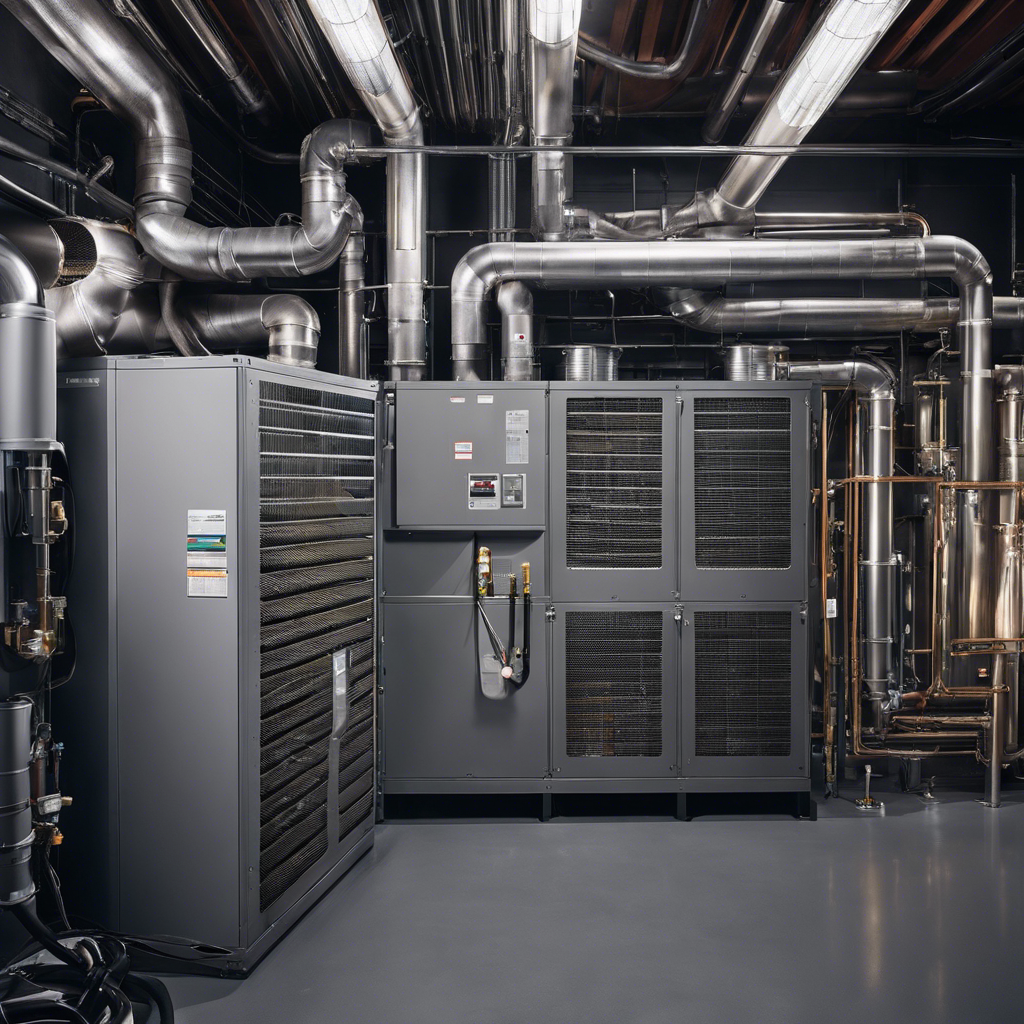In the world of commercial HVAC systems, understanding the factors that influence lifespan is crucial for businesses seeking reliable and efficient heating, ventilation, and air conditioning solutions.
From the quality of installation to the impact of external stressors, such as climate conditions and chemicals, there are many variables to consider.
Furthermore, proper maintenance and regular inspections play a vital role in extending the lifespan of these systems.
This article explores the various factors affecting the lifespan of commercial HVAC systems and provides insights into the signs that indicate it may be time for a replacement.
By being aware of these factors and expectations, businesses can make informed decisions to ensure the longevity and optimal performance of their HVAC systems.
Key Takeaways
- Proper maintenance, regular servicing, and timely repairs are crucial for extending the lifespan of commercial HVAC systems.
- The quality of initial installation plays a significant role in determining the longevity and efficiency of HVAC units.
- External stressors such as climate conditions, chemicals, and intensity of use can have a detrimental effect on the lifespan of commercial HVAC systems.
- Signs that indicate it may be time for replacement include frequent malfunctions, outdated technologies, increasing energy expenses, and inconsistent temperatures.
Factors Affecting Lifespan
Factors affecting the lifespan of commercial HVAC systems include:
- Proper maintenance, regular servicing, and timely repairs.
- Neglecting these essential tasks can lead to quicker wear and tear, resulting in a shorter lifespan for the HVAC system.
Additionally, the quality of the initial installation plays a crucial role in determining the system’s lifespan. A well-installed system ensures optimal performance and longevity.
The size of the HVAC unit and appropriate ductwork are also important factors. An undersized unit or improper ductwork can cause strain on the system, leading to premature failure.
Regularly changing HVAC filters at recommended intervals is another factor that impacts the lifespan. Clogged coils and dirty air ducts can impair functionality and efficiency, reducing the system’s lifespan.
Importance of Proper Maintenance
Regular maintenance is crucial for ensuring the longevity and optimal performance of commercial HVAC systems. Neglecting proper maintenance can significantly impact the life expectancy of these systems. Failure to perform routine maintenance can lead to component damage, reduced energy efficiency, and premature failure.
Maintenance services help prevent unnecessary stress on the equipment and ensure that it operates at its highest efficiency level. Regular inspections and cleanings can identify potential issues before they become major problems, saving time and money in the long run. Additionally, maintenance can help maintain indoor air quality by keeping the system clean and free from contaminants.
Impact of Installation Quality
A key determinant of the lifespan of commercial HVAC systems is the quality of their initial installation. The impact of installation quality on the longevity of a commercial HVAC unit cannot be overstated. Proper installation by qualified professionals is crucial to ensure optimal performance and efficiency.
When HVAC systems are incorrectly installed, flaws can arise, leading to reduced efficiency levels and shorter lifespans. The size of the unit and ductwork must be appropriate for the space, and installation by a licensed contractor is highly recommended. Errors in installation can result in increased wear and tear on components, causing premature failure and costly repairs.
Therefore, investing in high-quality HVAC installation is essential to maximize the lifespan and efficiency of commercial HVAC systems.
External Stressors and Their Effects
External stressors can significantly impact the lifespan and performance of commercial HVAC systems. Climate and weather conditions, such as extreme temperatures, humidity, and exposure to harsh elements, can accelerate wear and tear on HVAC units, leading to decreased efficiency and premature failure.
In warmer climates, heat pumps and air conditioning units may experience more strain, while furnaces in colder environments may suffer from increased workload. Chemical exposure from cleaning supplies and building materials can also cause damage to HVAC components, affecting their longevity.
Additionally, the intensity of use, such as continuous operation or frequent cycling, can further reduce the average life expectancy of commercial HVAC systems. It is crucial for businesses to consider these external stressors and take proactive measures to protect their HVAC units, ensuring optimal performance and longevity.
Signs It’s Time for Replacement
When considering the lifespan of commercial HVAC systems, there are clear indicators that suggest it is time for replacement.
Frequent malfunctions and visible signs of wear and tear, such as rust, leaks, or strange noises, are strong indicators that your commercial HVAC system is nearing the end of its lifespan.
Outdated technologies and an inability to meet heating and cooling demands can also signal the need for replacement.
If your energy expenses have been steadily increasing without explanation, it may be time to consider a new system.
Inconsistent temperatures and mechanical issues are further signs that your current HVAC system may not be adequately heating or cooling the space.
Higher energy bills compared to previous years can be a clear indication that it is time to replace the HVAC system and invest in a more efficient and reliable solution.
Frequently Asked Questions
What Is the Lifespan of a Commercial HVAC System?
The lifespan of a commercial HVAC system can vary depending on factors such as regular maintenance, appropriate sizing, and quality installation. Neglecting service and repairs can reduce the lifespan to 15 to 18 years.
What Is the Useful Life of Commercial HVAC System for Depreciation?
The useful life of a commercial HVAC system for depreciation is influenced by factors such as maintenance requirements and lifespan determinants. Proper maintenance and regular service can prolong the lifespan of the system, while neglect can lead to shorter depreciation periods.
How Long Do HVAC Systems Typically Last What Are the Main Factors That Influence This?
Commercial HVAC systems typically last between 15 to 25 years. Factors influencing their lifespan include the quality of installation, regular maintenance, climate conditions, and usage habits. Proper maintenance and timely repairs are crucial for extending the life expectancy of HVAC systems.
What Is the Typical Lifespan of an HVAC System and What Maintenance Is Required to Keep It Operating Efficiently?
The typical lifespan of an HVAC system can range from 15 to 25 years, but proper maintenance is crucial for optimal efficiency. Regular HVAC system maintenance includes filter changes, air duct cleaning, and professional inspections to address common issues and ensure energy efficiency.
Conclusion
In conclusion, the lifespan of commercial HVAC systems is influenced by various factors including maintenance, installation quality, and external stressors.
Proper maintenance and regular inspections are important for extending the lifespan of HVAC units. The use of service contracts and professional maintenance plans can also help protect and prolong the lifespan of these systems.
While the average lifespan of commercial HVAC systems is 15 to 25 years, well-maintained systems can last even longer, ultimately providing long-term savings.


